 Petzlover
Petzlover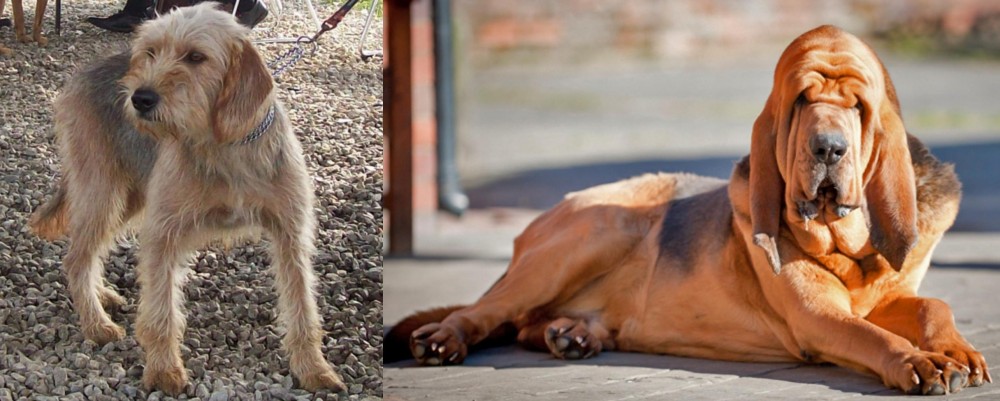 Bosnian Coarse-Haired Hound is originated from Bosnia and Herzegovina but Bloodhound is originated from United Kingdom. Both Bosnian Coarse-Haired Hound and Bloodhound are having almost same height. Bosnian Coarse-Haired Hound may weigh 48 kg / 105 pounds lesser than Bloodhound. Bosnian Coarse-Haired Hound may live 7 years more than Bloodhound. Bosnian Coarse-Haired Hound may have less litter size than Bloodhound. Bosnian Coarse-Haired Hound requires Moderate Maintenance. But Bloodhound requires Low Maintenance
Bosnian Coarse-Haired Hound is originated from Bosnia and Herzegovina but Bloodhound is originated from United Kingdom. Both Bosnian Coarse-Haired Hound and Bloodhound are having almost same height. Bosnian Coarse-Haired Hound may weigh 48 kg / 105 pounds lesser than Bloodhound. Bosnian Coarse-Haired Hound may live 7 years more than Bloodhound. Bosnian Coarse-Haired Hound may have less litter size than Bloodhound. Bosnian Coarse-Haired Hound requires Moderate Maintenance. But Bloodhound requires Low Maintenance
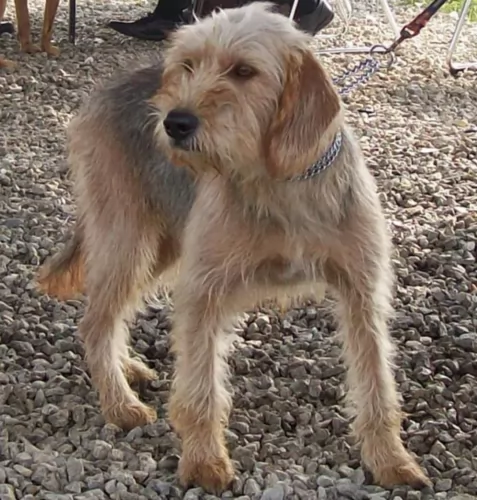 Once known as the Illyrian Hound and also known also as the Barak, the Bosnian Coarse-haired Hound was developed in Bosnia, and as a scenthound, it would hunt large game. Barak belongs to the hound group so typically this dog wants to chase wild game which he used to do long ago for his master.
Once known as the Illyrian Hound and also known also as the Barak, the Bosnian Coarse-haired Hound was developed in Bosnia, and as a scenthound, it would hunt large game. Barak belongs to the hound group so typically this dog wants to chase wild game which he used to do long ago for his master.
The breed was developed into what is's current looks are. In the 1890’s he was crossed with Italian gun dogs with local scent hound stock. It is a rare breed, and outside of Bosnia and Herzegovina, it is all but unknown.The dog is also known as the Bosnian-Rough-Coated Hound or the Illyrian Hound. In 2006 the breed was recognized by the United Kennel Club as the Barak in the Scenthound group. Unfortunately, while the Bosnian Coarse-Haired Hound is still found in Bosnia, there is plenty of conflict in the country, and the future of the dog is unknown.
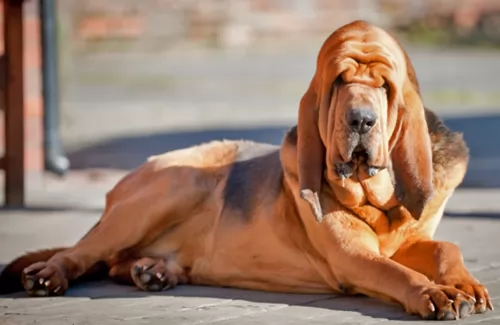 The history of the Bloodhound breed is a fascinating one. Known as a Sleuthhound for its ability to smell out the culprit and bag the prey. Even more so the Bloodhound is known for tracking and finding lost people. He is famous for finding human scents and being able to follow them even days or weeks after the person is lost. They are also able to track people over a great amount of land and have been known to successfully track escaped prisoners or wanted criminals. They are descended from the Saint-Hubert Hounds that were bred at the Abbey/Monastery at Saint-Hubert, Belgium. According to the legends the St. Hubert hounds were bred by the Monks in 1000AD. This hound was thought to be a mixed breed rather than a purebred. That’s because the ancestry of this hound is not really known but it is known that the monks bred them and sent several to the King of France annually. Only black hounds were gifted.
The history of the Bloodhound breed is a fascinating one. Known as a Sleuthhound for its ability to smell out the culprit and bag the prey. Even more so the Bloodhound is known for tracking and finding lost people. He is famous for finding human scents and being able to follow them even days or weeks after the person is lost. They are also able to track people over a great amount of land and have been known to successfully track escaped prisoners or wanted criminals. They are descended from the Saint-Hubert Hounds that were bred at the Abbey/Monastery at Saint-Hubert, Belgium. According to the legends the St. Hubert hounds were bred by the Monks in 1000AD. This hound was thought to be a mixed breed rather than a purebred. That’s because the ancestry of this hound is not really known but it is known that the monks bred them and sent several to the King of France annually. Only black hounds were gifted.
Some kings preferred not to hunt with these hounds thinking them not good enough while others thought the only use for them was as a leash hound. All described the St. Hubert as long in body with short legs. These gifts continued until the French Revolution when hunting in France was greatly reduced until the 19th century. The original St. Hubert strain became extinct in the 19th century and that the current European St. Hubert hound has its origins in the Bloodhound. The Bloodhound as a separate breed was already established in Europe by the middle of the 14th century. They were used as leach hounds to sniff out the prey so that the pack hounds could chase and keep it “at bay”. They were also used from the beginnings of the breed to track humans. At this time they were often known as sleuth hounds. As recorded by John Caius – the authority on Bloodhounds from their origins – writes about the breeds ability to find and track the scent of blood – thus becoming the Bloodhound and its use to track poachers and thieves. He also reported that the Bloodhound and the Sleuth Hound were the same basic breed. The number of Bloodhounds in Britain gradually declined until few remained after World War II. Britain has gradually built their breed back up by importing dogs from America. It was during the 19th century that the Bloodhound was imported into France by breeders who wished to reestablish the St. Hubert Hound. Thus the St. Hubert is both the ancestor and descendent of the Bloodhound. The Britain’s continue to believe that the Bloodhound is a native British breed.
The Bloodhounds in America have had great success as companion animals, with police departments and forest rangers and showing in the prestigious Westminster Kennel Club in New York. There are more Bloodhounds in the United States than anywhere else in the world.
In the end the Anglo-Saxton Bloodhound cannot be specified with any real certainty. Many believe it was not the St. Hubert that the Bloodhound descended from but rather the Norman hound or the sleuth-hound. Many believe it could have included other breeds such as the southern hound, the dun-hound and the Talbot. It cannot be proven today it the Bloodhound’s origins come from Belgian or England.
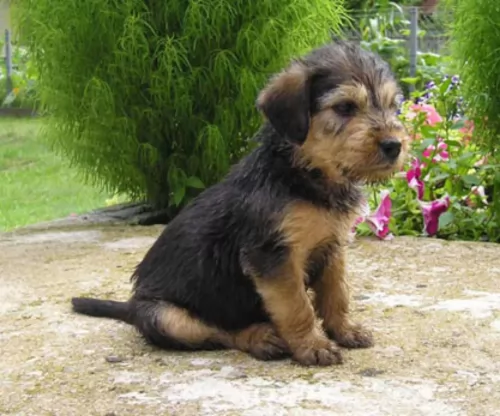 The medium to large sized dog is known for his coarse, shaggy coat of wheaten, black, red or grey shades. Some dogs are bi- or tri-colored. The shaggy coat has a thick undercoat and this is what provides insulation for the dog to cope in extremely cold weather conditions. He is a moderate shedder and he will need to be brushed thoroughly twice a week to remove his loose hairs.
The medium to large sized dog is known for his coarse, shaggy coat of wheaten, black, red or grey shades. Some dogs are bi- or tri-colored. The shaggy coat has a thick undercoat and this is what provides insulation for the dog to cope in extremely cold weather conditions. He is a moderate shedder and he will need to be brushed thoroughly twice a week to remove his loose hairs.
Some dogs have white marks on the head. The height of this dog ranges between 46–55cm at the withers and he can weigh in at between 16–24kg. He is well known for his facial hair – a moustache and beard on the muzzle with large, brown eyes and an intelligent, alert and playful expression.The Bosnian Coarse Haired Hound is a robust dog with a deep chest that provides him with a well proportioned appearance. The brown eyes have bushy eyebrows, the ears fairly long and floppy and the tail long and somewhat feathery.
The Bosnian Coarse-haired Hound makes an exceptional pet because he is loyal and friendly with his family members and patient and tolerant of children’s antics. He also gets on well with other pets in the house.
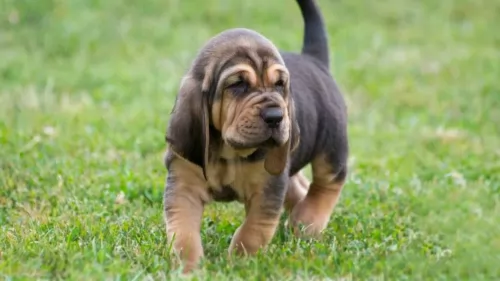 When being judged for confirmation in a show ring, the preference is for a larger dog, with an unusual skeleton in respect to its large size and heavy weight in the bones. They have a narrow head, flat at the sides, but long. They have deep set eyes buried in the deep, long face and wrinkles. The eyes might be yellow or run the gamut to deep hazel depending upon the color of the dog. The long velvety ears and thin and low set on the head. These long ears are as much a part of the Bloodhounds Olfactory system as his amazing nose. They curl backward and inward as the ends. There is a large amount of loose skin on the head and at the jowls. When the Bloodhound lowers his head the loose folds and ridges of skin are prominent on the face and forehead.
When being judged for confirmation in a show ring, the preference is for a larger dog, with an unusual skeleton in respect to its large size and heavy weight in the bones. They have a narrow head, flat at the sides, but long. They have deep set eyes buried in the deep, long face and wrinkles. The eyes might be yellow or run the gamut to deep hazel depending upon the color of the dog. The long velvety ears and thin and low set on the head. These long ears are as much a part of the Bloodhounds Olfactory system as his amazing nose. They curl backward and inward as the ends. There is a large amount of loose skin on the head and at the jowls. When the Bloodhound lowers his head the loose folds and ridges of skin are prominent on the face and forehead.
For many centuries all different colors of Bloodhounds could be found. Today however they are pretty much red, black and tan and black and liver. The Bloodhound is a powerful dog and is larger than most breeds of hounds.
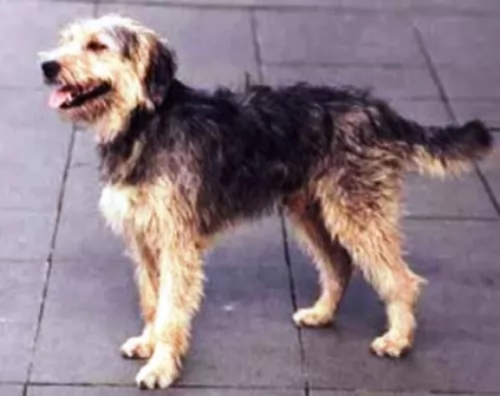 Bosnian Coarse-Haired Hounds are loyal, loving dogs. They are intelligent too and easy to train. With training and socialization, they are well behaved and a pleasure to have in the home. He makes an excellent pet for any family who bears in mind that he needs lots of exercise. When he uses up his energy with games, walks and other activities, he becomes a playful friend with children in the house.
Bosnian Coarse-Haired Hounds are loyal, loving dogs. They are intelligent too and easy to train. With training and socialization, they are well behaved and a pleasure to have in the home. He makes an excellent pet for any family who bears in mind that he needs lots of exercise. When he uses up his energy with games, walks and other activities, he becomes a playful friend with children in the house.
His temperament fits his tousled looks and he is outgoing, amicable, social and friendly. He wants to be a member of the family and to be part of all the activities going on. When he is happy and well cared for, he makes a splendid pet.
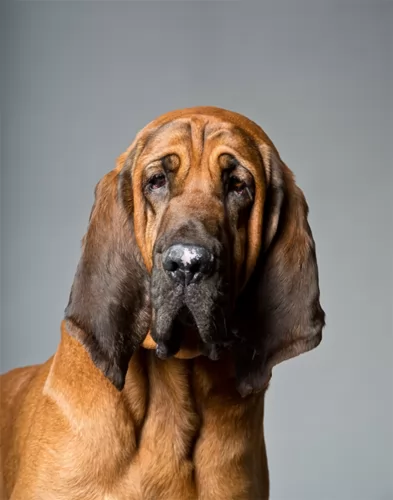 The Bloodhound is known as a gentle soul and he truly is. They are affectionate and gentle with people and children. However, their strong will to track can make them stubborn and hard to handle and train. They are easy going dogs and really like to be with people, children and other dogs. They are affectionate but tend to be set in their ways.
The Bloodhound is known as a gentle soul and he truly is. They are affectionate and gentle with people and children. However, their strong will to track can make them stubborn and hard to handle and train. They are easy going dogs and really like to be with people, children and other dogs. They are affectionate but tend to be set in their ways.
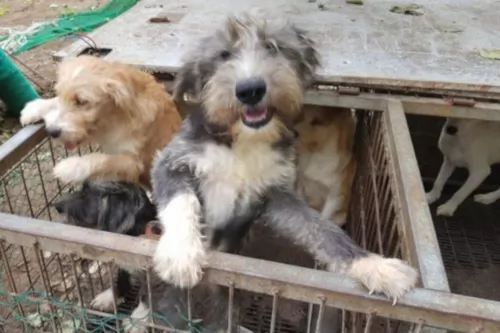 The Bosnian Coarse-Haired Hound is a generally healthy breed, but just like with other dogs, he can also be prone to some hereditary health issues.
The Bosnian Coarse-Haired Hound is a generally healthy breed, but just like with other dogs, he can also be prone to some hereditary health issues.
This is essentially a kind of degenerative arthritis and can be painful for your pet. You’ll notice that he battles to get up after lying down. There are some treatment options that can alleviate his pain and make him more comfortable, but there is no cure.
It is essentially where the dog’s hips partially dislocate and it is a genetic condition. It is more usual in larger dogs but any dogs can battle with hip dysplasia.
This occurs when your dog’s kneecap is dislocated. It can be a genetic malformation or trauma. A dislocated kneecap is a common knee joint abnormality and a dog with a dislocated kneecap will have abnormal hind-limb movement, occasional skipping and even lameness.
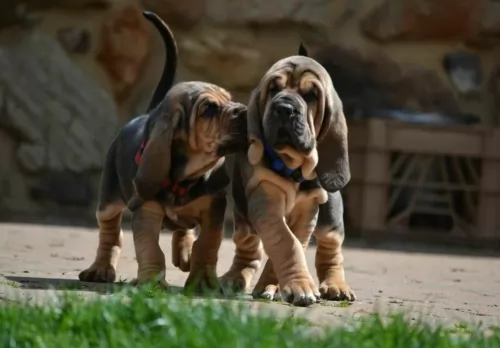 Obviously with ears like the Bloodhound there is always a chance for problems and serious infections. The ears need to be cleaned daily. Because their coat is so thick, they can overheat easily, and they are very prone to bloat, as are many large animals. However, with the Bloodhound, Bloat is the number one killer. Their lifespan is one of the shortest of all dogs at 6.75 years.
Obviously with ears like the Bloodhound there is always a chance for problems and serious infections. The ears need to be cleaned daily. Because their coat is so thick, they can overheat easily, and they are very prone to bloat, as are many large animals. However, with the Bloodhound, Bloat is the number one killer. Their lifespan is one of the shortest of all dogs at 6.75 years.
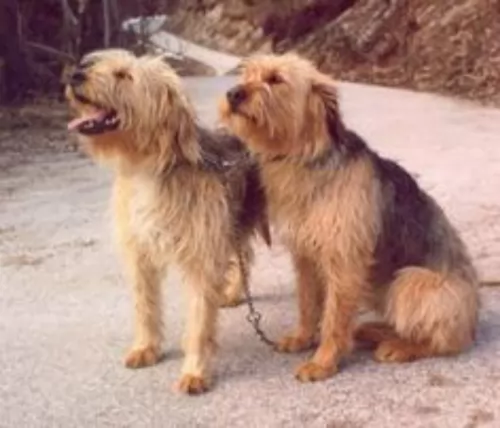 This bearded dog is energetic so he will need to be exercised by you. You can take him on walks or take him to the park or play ball games with him. He will be prone to excessive barking and other kinds of destructive behavior through no fault of his own if you buy a pet like this and just plonk him in your back garden. He wants to be a part of your family and exercising him daily is part of owning a pet like the Bosnian Coarse Haired Hound.
This bearded dog is energetic so he will need to be exercised by you. You can take him on walks or take him to the park or play ball games with him. He will be prone to excessive barking and other kinds of destructive behavior through no fault of his own if you buy a pet like this and just plonk him in your back garden. He wants to be a part of your family and exercising him daily is part of owning a pet like the Bosnian Coarse Haired Hound.
The Bosnian Coarse Haired Hound is a strong-willed dog and intelligent too. Train him and socialize him because then he becomes such an obedient, amicable pet who just wants to please.
Your Barak is an energetic breed so he will need top quality food packed with vitamins and minerals that can provide him with the energy he needs. When it comes to feeding your Bosnian Coarse Haired Hound, store-bought dog food comes in a dry form or wet canned form.
If you’re unfamiliar with these foods, you can also speak to your veterinarian about the best food for your pet. Many dogs are lucky because their owners provide homemade diets – raw or cooked meat, vegetables and rice. A good multivitamin with omega 3 is also recommended for your pet as this can ensure his coat is shiny and his eyes bright and alert. Fresh, cool water must be within reach day and night.
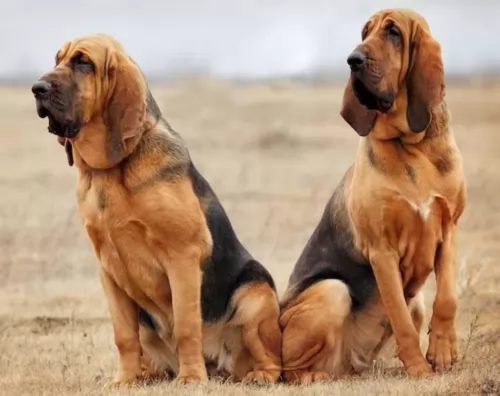 The Bloodhound is not a high energy, fast moving dog but that does not mean he doesn’t have serious nutritional needs. An overweight Bloodhound is on a course to an early demise. They should be fed a high-quality food once a day or split into two daily servings. Do not feed them right before or right after strenuous exercise and remember that strenuous exercise for a Bloodhound is considerably less than it is for a terrier.
The Bloodhound is not a high energy, fast moving dog but that does not mean he doesn’t have serious nutritional needs. An overweight Bloodhound is on a course to an early demise. They should be fed a high-quality food once a day or split into two daily servings. Do not feed them right before or right after strenuous exercise and remember that strenuous exercise for a Bloodhound is considerably less than it is for a terrier.
As previously mentioned the number one cause of death in Bloodhounds is Bloat. They are also prone to cancer. They have minor issues with their eyes, but their ears and skin are also major concerns. Clean the ears daily and wipe out the skin folds and wrinkles to prevent infections. They should be test for hip and elbow dysplasia simply because they are large dogs, though these conditions are less common in Bloodhounds.
Though the Bloodhound is known as a couch potato his stamina and activity levels are usually greatly underestimated. He can follow a scent for 7-10 hours over miles of terrain with out a problem. He needs daily exercise such as long walks on a leash. Do not take your Bloodhound out off leash because if he picks up a scent and wanders off you will not be able to get his attention to call him back.